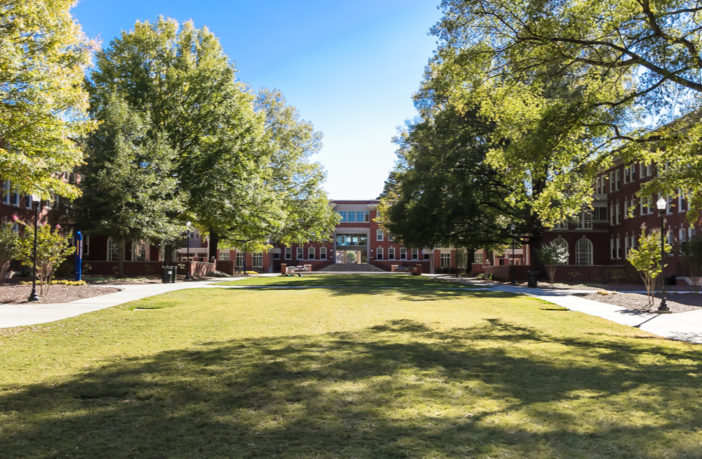Climate change study needs to be embedded in higher education at all levels to prepare learners for their roles in work and wider society, says a new paper co-authored by an OU Associate Lecturer.
The bold, rapid action needed to tackle the climate and ecological crisis offers an unparalleled opportunity for higher education institutions, argues the working paper from a group of academic experts from the COP26 Universities Network.
The authors say that with unprecedented change faced by all sectors of the economy and society, new skills and an educational focus are critical to prepare current and future generations to make decisions under uncertainty.
They stress that embedding climate change education across HE practice should also be a dynamic process that can respond to society’s changing circumstances. Their four-part recommendations are designed to be a starting point.
“Outlining the building blocks of mainstreaming climate change education”

Associate lecturer Peter Wood is a co-author of the report
Contributing editor and OU Associate Lecturer Dr Peter Wood, said:
“Fixing climate change will require everyone to learn new knowledge and skills. Clearer, more stable public policy will allow students and employers to make more informed choices; plus we’ve seen a growing demand for climate education.
“To meet this demand, Higher Education employers need to invest in upskilling their own staff, to make sure that climate understanding can be built across the whole curriculum, using a range of innovative learning techniques.”
Dr Wood contributed knowledge and analysis on the growth of student and employer demand for climate change education. Research shows that demand has grown beyond traditional “environmental” specialisms, to create a need for new areas of curriculum.
Catherine Graves, co-author and postgraduate researcher at the University of Leeds, adds:
“This working paper outlines the building blocks needed for mainstreaming climate change education and the barriers to implementation, as well as showcasing case studies from across the UK which highlight how successful, strategic and impactful climate change education can be.”
The paper says the complexity of the climate change challenge means all disciplines have a role to play in delivering education for the net-zero transition, and student and employer demand for related education reflects this need for it to be embedded in all subjects.
Paper points to embedding climate change education into all university structures
The paper explores key issues that UK higher education institutions should consider, individual and institutional barriers and external enablers. It lays out four suggestions as a starting point for embedding climate change education into all university structures, and directing the talent towards the creation of a resilient and zero-carbon future:
- Building internal capacity: provision of continued professional development on climate change and paid training time for staff. Such a top down approach should enable the practical skills and knowledge to incorporate climate change education across all curricula
- Ensuring alignment and leadership: institutions should produce a strategy for their climate change education provision, including alignment with national and global climate targets and action, and links to the ‘invisible curriculum’, or values, of non-teaching operations
- Partnerships for curriculum development: with industry, central government, local government and third sector organisations to enable provision of climate change education that takes full account of spatial and temporal demands and opportunities in the UK’s net-zero transition
- Aligning assessment and outcomes: work with funding and regulatory bodies, unions, professional and awards agencies to ensure staff capacity and graduate attributes fully align with the demands of addressing climate change
New skills and an education focus are critical
Many UK universities are already taking proactive steps to embed climate change education in their curricula, and the working paper is supported by eleven case studies showcasing a range of climate change education initiatives from UK Higher Education Institutions.
As well as following the recommendations above, the report suggests higher education institutions develop learning outcomes for climate change education that include understanding the scale, urgency, causes, consequences of and solutions for climate change, social norms as drivers, and the ability to identify routes to direct involvement in solutions.
The authors argue that with unprecedented change faced by all sectors of the economy and society, new skills and an educational focus are critical to prepare current and future generations to make decisions under uncertainty. As data emerges, flexibility is crucial as we respond to the climate and ecological crises as they intensify.
Dr Harriett Thew, co-author and UKRI COP26 Research Fellow at the University of Leeds says:
“The climate crisis is impacting the communities we live in, the industries we work in, and the lives and livelihoods of others around the world. This working paper provides research insights and practitioner expertise to support Higher Education Institutions looking to mainstream climate change education, to prepare students of all subjects to respond to this complex challenge.”
About the COP26 Universities Network
Established in 2020, the COP26 Universities Network brings together more than 80 UK universities and research institutes. They aim to improve access to evidence and academic expertise for COP26, the UN Climate Summit in Glasgow for the UK Government, NGOs and the international community, working together to deliver ambitious climate change outcomes.



